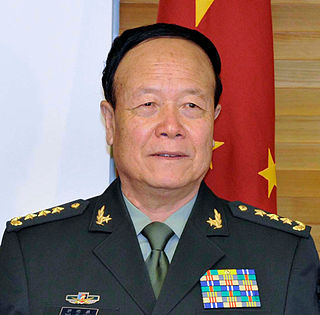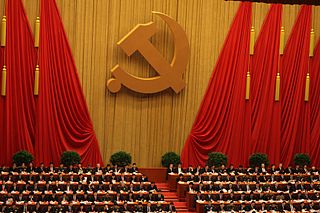
The Standing Committee of the Central Political Bureau of the Communist Party of China, usually known as the Politburo Standing Committee (PSC), is a committee consisting of the top leadership of the Communist Party of China. Historically it has been composed of five to eleven members, and currently has seven members. Its officially mandated purpose is to conduct policy discussions and make decisions on major issues when the Politburo, a larger decision-making body, is not in session. According to the party's Constitution, the General Secretary of the Central Committee must also be a member of the Politburo Standing Committee.
The Orders of precedence in China is the ranking of political leaders in China for the purposes of event protocol and to arrange the ordering of names in official news bulletins, both written and televised. It is also sometimes used to assess perceived level of political power. Although there is no formally published ranking, there is usually an established convention and protocol, and the relative positions of Chinese political figures can usually be deduced from the order in meetings and especially by the time and order in which figures are covered by the official media.

The Central Secretariat of the Communist Party of China is a body serving the Politburo of the Communist Party of China and its Standing Committee. The secretariat is mainly responsible for carrying out routine operations of the Politburo and the coordination of organizations and stakeholders to achieve tasks as set out by the Politburo. It is empowered by the Politburo to make routine day-to-day decisions on issues of concern in accordance to the decisions of the Politburo, but it must consult the Politburo on substantive matters.
The Shanghai clique is the name given to an informal group of officials in the Communist Party of China, especially those who serve in the Central Committee or the Central Government of China, who rose to prominence in connection to the Shanghai municipal administration under Jiang Zemin, former General Secretary of the Communist Party of China.

The Central Foreign Affairs Commission, formerly known as the Central Foreign Affairs Leading (Small) Group is a commission of the Central Committee of the Communist Party of China that exercises general oversight on matters related to foreign affairs. It is currently chaired by Party General Secretary and President Xi Jinping, who is assisted by its office director and Premier Li Keqiang is deputy director. Politburo member Yang Jiechi, and its membership includes officials of minister-rank and above.
The 16th National Congress of the Communist Party of China was held in Beijing between November 8th and 14th, 2002. It was preceded by the 15th National Congress of the Communist Party of China. 2,114 delegates and 40 specially invited delegates attended this and elected a 356-member 16th CPC Central Committee, as well as a 121-member Central Commission for Discipline Inspection (CCDI). The Congress marked the nominal transition of power between Jiang Zemin and Hu Jintao, who replaced Jiang as General Secretary, and a newly expanded Politburo Standing Committee line-up. The institutional transition would be completed in state organs by the 2003 National People's Congress in March. Jiang, however, remained head of the Central Military Commission, therefore in practice, the power transition was not complete. The Party National Congress examined and adopted the amendment to the Constitution of the Communist Party of China proposed by the 15th CPC Central Committee, and decided to come into force as from the date of its adoption. An amendment to the Constitution was approved the Party National Congress, with Jiang Zemin's signature ideology of "Three Represents" written into it. This congress was succeeded by the 17th National Congress of the Communist Party of China.
The 17th National Congress of the Communist Party of China was held in Beijing, China, at the Great Hall of the People from 15 to 21 October 2007. The Congress marked significant shift in the political direction of the country as CPC General Secretary Hu Jintao solidified his position of leadership. Hu's signature policy doctrine, the Scientific Development Concept, which aimed to create a "Socialist Harmonious Society" through egalitarian wealth distribution and concern for the country's less well-off, was enshrined into the Party Constitution. It was succeeded by the 18th National Congress of the Communist Party of China.
The 16th Politburo of the Communist Party of China was elected by the 16th Central Committee of the Communist Party of China on November 15, 2002. It was nominally preceded by the 15th Politburo of the Communist Party of China. This was the main vangaurd executive committee functioning within the Standing Committee of the Communist Party of China. It was formally superseded by the 17th Politburo of the Communist Party of China.
The 15th Politburo of the Communist Party of China was elected by the 15th Central Committee of the Communist Party of China on September 19, 1997. It was preceded by the 14th Politburo of the Communist Party of China. It served until 2002.
The 14th Politburo of the Communist Party of China was elected by the 14th Central Committee of the Communist Party of China on October 19, 1992. It was preceded by the 13th Politburo of the Communist Party of China. It served until 1997. It was succeeded by the 15th Politburo of the Communist Party of China.
The 16th Central Committee of the Communist Party of China was in session from 2002 to 2007. It held seven plenary sessions. It was set in motion by the 16th National Congress of the Communist Party of China. The 15th Central Committee preceded it. It was followed by the 17th Central Committee of the Communist Party of China.
The 15th Central Committee of the Communist Party of China was in session from 1997 to 2002. The 14th Central Committee preceded it. The China Democracy Party formed in this period, and was suppressed. It held seven plenary sessions. It was followed by the 16th Central Committee of the Communist Party of China.

Guo Boxiong was a general of the People's Liberation Army of China. He served as the Vice Chairman of the Central Military Commission, China's top military council, between 2002 and 2012. During the same period he also held a seat in the Politburo of the Communist Party of China, China's top decision-making body. He was expelled from the Communist Party on 30 July 2015. On July 25, 2016, he was sentenced to life imprisonment for bribery.

The 18th National Congress of the Communist Party of China began on November 8, 2012 at the Great Hall of the People. It was preceded by the 17th National Congress of the Communist Party of China. Due to term and age limits restrictions, seven of the nine members of the powerful Politburo Standing Committee (PSC) retired during the Congress, including Hu Jintao, who was replaced by Xi Jinping as General Secretary of the Communist Party of China. The Congress elected the 18th Central Committee of the Communist Party of China, and saw the number of Politburo Standing Committee seats reduced from nine to seven. It was succeeded by the 19th National Congress of the Communist Party of China.

The Xi–Li Administration of the People's Republic of China began in 2013, when Xi Jinping and Li Keqiang succeeded Hu Jintao and Wen Jiabao following the 18th National Congress of the Communist Party. It is speculated that Xi will solidify the political power of General Secretary of the Communist Party of China, for the absolute command of the Communist ideology over pragmatic approach, and on the economic front there will be no liberalization but socialist entrenchment.

The Central Financial and Economic Affairs Commission, formerly known as the Central Leading Group for Financial and Economic Affairs from 1989–2018, is a commission of the Central Committee of the Communist Party of China at the dependence of the CPC Politburo in charge of leading and supervising economic work of both the CPC Central Committee and the State Council. The Commission is headed by CPC General Secretary or Premier of the State Council.
Events in the year 2012 in China.
The 18th Central Politburo of the Communist Party of China was elected by the 18th Central Committee of the Communist Party of China on 15 November 2012, which was formally elected by the 18th National Congress of the Communist Party of China. It was nominally preceded by the 17th Politburo. It was ultimately succeeded by the 19th Politburo of the Communist Party of China.
The 1st Session of the 10th National People's Congress was held from March 5 to March 18 in Beijing, China, in conjunction with the 2003 session of the Chinese People's Political Consultative Conference.

The Central Comprehensively Deepening Reforms Commission, formerly known as the Central Leading Group for Comprehensively Deepening Reforms is a policy formulation and implementation body set up under the Politburo of the Communist Party of China in charge of "Comprehensively Deepening Reforms". These reforms are intended to be even more far-reaching than the previous round of comprehensive Chinese economic reforms initiated by Deng Xiaoping.






